Early this spring, the Smithsonian Museum in Washington DC, famous as a time capsule of American history and culture, reached out to Dr Ruth Westheimer and asked her to donate an object to its vast collection. It’s there that you can find such iconic totems of Americana as the glittery red shoes Judy Garland wore in The Wizard of Oz, or influential TV cook Julia Child’s kitchen, fully reassembled. Soon you will also be able to find the microphone that Westheimer used at WYNY, the New York radio station that helped cement her fame as a frank-talking sex therapist in 1981, in no small part thanks to her unmistakable accent.
“I’m very lucky, because it’s a combination of the German, the Hebrew, the Swiss, the French, and that accent helped because as soon as people heard it they knew it was me,” she says as she directs me around her tiny kitchen, filling the kettle for tea, retrieving a knife to cut a cheesecake. If you find yourself on TV talking about vaginas, penises and clitorises, an accent like Westheimer’s might also feel like a blessing. It’s hard to feel indignant or vexed when the person dishing advice on erectile dysfunction is a 90-year-old Jewish lady with long rolling R’s and a Munchkin giggle.
Humour and charm has long been Westheimer’s reflex for diffusing anxiety and shame. “In the Talmud, it says that a lesson taught with humour is a lesson retained,” she says. “I came from an Orthodox Jewish home so sex for us Jews was never considered a sin.” Has she never felt flummoxed by a question, or found herself blushing? Westheimer thinks for a moment. “The best answer to that is that when someone asked me a question about sex with animals, and I responded: ‘I’m not a veterinarian.’” She peers into a cupboard and frowns. “I want to find some tea, but I don’t find tea,” she muses. Not a problem, I assure her. Whatever is easiest. “Orange juice is easiest,” she says, producing a carton of Tropicana from the fridge.
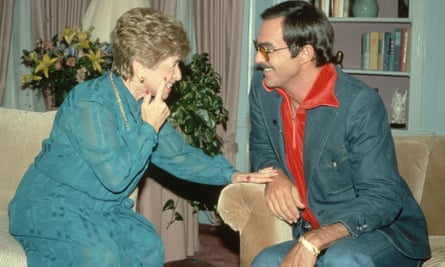
We are in Manhattan where Westheimer has lived for 55 years in a two-bedroom apartment overlooking the Hudson River. From the window, she points to the other bank – a steep escarpment known as the Palisades. “That used to be for nuns, over there,” she says, indicating a monastery-style building. “And when it snows it’s beautiful.” In the wake of her ascent to fame, friends urged her to move to Fifth Avenue, but Westheimer always resisted. She likes the neighbourhood’s European flavour, the fact that it was settled by German Jews. And besides, in the nearby Fort Tryon Park, one of the city’s most beautiful, sits a bench named in honour of her third husband, Fred Westheimer, who died in 1997. She has added an inscription from the Bible: “My beloved has gone down to his garden to gather lilies.” Today she gets a kick whenever she sees couples kissing there. Being a widow, she says, is harder than being an orphan. Children are resilient, adults less so.
These are busy days for Westheimer, the subject of a new documentary, Ask Dr Ruth, that receives its European premiere at Sundance Film Festival London later this month. She will be visiting Japan for a screening, before hitting Oxford University to debate pornography (she’s a fan), in addition to annual trips to Switzerland, where she spent the war in an orphanage, and Israel. There are also her teaching schedules at Hunter and Columbia universities in New York, and a prodigious publishing output, including a column for Time, an upcoming children’s book, and a new edition of her bestselling guide, Sex for Dummies, that will include chapters addressing millennials and the metastasising issue of loneliness. Immediately after our interview she is due at the opening of an exhibition at the Museum of Jewish Heritage titled “Auschwitz: Not Long Ago, Not Far from Here.” Westheimer, who is on the board of the museum, is proud of the name. “It’s for the Holocaust deniers and those people who have Holocaust fatigue, who say, ‘Stop talking about it, it’s so long ago.’”
We tour the living room, a jumble of tchotchkes and books – a copy of Michael Wolff’s Trump exposé, Fire and Fury, Ruth Bader Ginsburg’s autobiography. There are mementoes of Shirley Temple, Westheimer’s favourite actor, and photos of her with the Obamas, with the Clintons and one of her dancing with the conductor Zubin Mehta, a memory that provokes particular delight. She was at a fundraiser for the Israel Philharmonic Orchestra. “I was dancing with a Japanese guy, and a man came and tapped me on the shoulder and said: ‘The Maestro wants to dance with you.’ I dropped the Japanese like a hot potato and danced with Zubin.”
Just inside the entrance, in pride of place, is a photo of David Ben-Gurion and Golda Meir, the first and fourth prime ministers of Israel. Westheimer was a member of the Jewish underground after the war, operating as a sniper (she learned to shoot by imagining Hitler was her target), and fighting the British, until she almost lost her legs in an explosion. But she would like readers to know she is grateful to Britain for organising the Kindertransport that brought 10,000 children to the UK. “Some of the children were able to save their parents, by going from house to house and asking for help in finding them work. When I was in Switzerland, I still had the fantasy I could have saved my parents and family if I’d stayed in Germany.” She shakes her head. “All nonsense. If they had not made the sacrifice to send their only child to Switzerland, I wouldn’t be alive.”
A powerful scene in Ask Dr Ruth, rendered into animation, shows young Westheimer waving goodbye to her mother and grandmother at Frankfurt station. It’s the last time she would see them. Her parents gave her life twice, she says: “Once when I was born, and once when they sent me to Switzerland.” When the war ended the children at her orphanage were gathered together while names of surviving parents were read aloud. Her parents were not among them. Put on a train, she was sent to Marseille, where she boarded a ship to Palestine. She was 17.
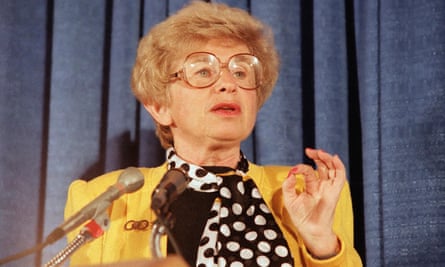
In the 1950s she returned to France, divorced her first husband, married a second time, and booked a passage to New York, travelling fourth class. Although she intended to return to Israel the arrival felt like a homecoming. She never left. Her marriage did not survive, although they had a daughter, Miriam. For Westheimer, the failure of marriage two was an important lesson: not having a satisfying sex life could be a problem, but intellectual boredom was insurmountable.
At this year’s New York Pride, Westheimer will ride on a carnival float to mark the 50th anniversary of Stonewall, a tribute to her outsize presence in the 1980s when her empathy cut through a miasma of bigotry. In the long, dark years of the Aids panic, she was among the few pinpricks of light. It was Dr Ruth who insisted there was no such thing as “normal” – everything was normal, as long as it involved two consenting adults in the privacy of their home. She recalls attending the Institute for Human Identity in the 1980s. “I wanted to learn how to work with homosexuals,” she says. “There were no lesbian couples coming; maybe lesbians didn’t need sex therapy. Maybe one woman knew better how to give another woman an orgasm.”
Time has finally caught up with Dr Ruth. Her attitudes no longer seem atypical. But if her approach to sex is now mainstream, anxiety around sexual desire and consent threaten to place her at odds with the very people who once welcomed her sex-positive thesis. “This idea that once you are aroused and have already started that you should then ask, ‘Can I touch your left breast, or your right breast?’ is just nonsense,” she says. “Nobody has any business being in bed, naked – two guys, two women, or a man and a woman – if they haven’t decided to have sex.”
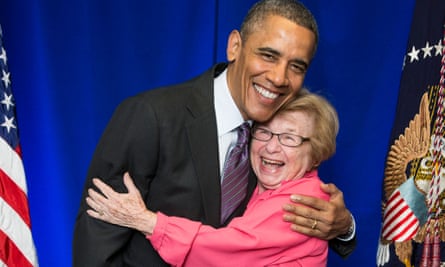
She frets, also, that innocent compliments risk being stigmatised. “You can’t tell a woman any more that you like her blouse,” she says, and then gestures to herself. “By the way, do you like my blouse?”
Although no technophobe – in the documentary we see her conversing with Alexa – Westheimer believes our phones may be eroding our talents for conversation. “You walk into a restaurant these days, and what you see is everyone with their phone next to them,” she says. “That is terrible. Instead of concentrating on the relationship, on the needs and activities and interests of the other person, they are constantly looking at their phone.”
And she is sceptical of the idea that millennials are too busy to form relationships. “Don’t put sexual experience on the back burner,” she says. “Make time. After all, immigrants to this country worked much harder. They had to come in on Saturdays, even if they were observant Jews, otherwise they were told, ‘Do not come in Monday.’
Westheimer has a rule about not talking politics, but she also knows sex is political. Endorsing homosexuality or championing a woman’s right to choose, puts her firmly on one side of America’s culture wars. The one issue on which she will not stay silent is the one she feels compelled to speak about from personal experience. “I do say how upset I am when I see children being separated from their parents,” she says. “I have in my bones, and in my blood, the knowledge that you have to help the people who are persecuted.”
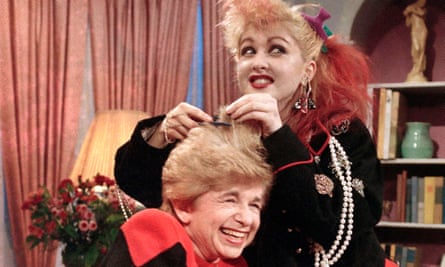
In spite of her curtailed childhood, Westheimer fizzes with energy. She fetches a leather frame on which is embossed in gold letters, It Can Be Done. “I love this,” she says. “It really is my motto in life.” She reads out the brand: “A-S-P-R-E-Y. I got it for free,” she says.
Does she think she’ll ever slow down? “No,” she says, then gestures to my notepad: “Write that down.” On 4 June, Westheimer turns 91. “This time I’m not going to make a big party,” she says. By not big, she means around 30 to 40 people. Last year there were more than 300.
In her chatty 2015 book, The Doctor is In, Westheimer offers a useful insight into how she lives with the trauma of her childhood. The solution, she says, is to focus on the present: “Pay attention to the people around you. Ask questions and listen to the answers. Tell everyone what happened to you during the day and make it as amusing as possible. Accentuate the positive, try to bring everyone’s spirits up; by doing that, you’ll find your own elevated.”
It’s a philosophy that has guided Westheimer through life. In the lobby of her building, the doorman pinches his fingers together, and brings them to his lips in a kiss when I mention I am coming from Dr Ruth’s. “A sweetheart,” he says. “If there were more people like that we’d never be at war. She’s nothing but a good-hearted person.”
Dr Ruth’s top 15 tips
Sex before dinner, afterplay, and fun with onion rings…
1. People are not Siamese twins. They don’t want to have sex, or the same amount of sex, at the same time. The important thing is that a couple adjusts to it.
2. I do suggest that people have sex before they go out to dinner.
3. Many people grow jealous of their partner’s fantasy lovers. That’s a big mistake. After years of being together, many people need fantasy to become sufficiently aroused for sex… with their partner!
4. If you’re always waiting for that orgasm, you won’t enjoy the rest of the lovemaking as much. You risk being goal oriented, impatiently waiting for that orgasm.
5. You don’t have to share your fantasies. If you have sex with your partner, and the woman thinks about a whole football team in bed with her, that’s OK, but keep your mouth shut about it.
6. Your sex life is not supposed to come to an end just because you’ve hit a certain age.
7. Men, want stronger sperm? Eat walnuts.
8. Make up your own events. Like an onion ring tossed on to an erect penis!
9. Put down the screen and get to know each other.
10 A good sexual experience needs time: for arousal as well as for hugging and kissing after sex. Afterplay is part of the arousal phase for the next encounter.
11. The more women engage in sex, the less severe the symptoms of menopause related to good sexual functioning will be.
12. In nursing homes, I would like to make sure that there’s a dating room, with a sign like in a hotel that says do not disturb. There’s a need for caressing and being held at every age.
13. Parade your body in front of your partner, show it off, try to feel good about it.
14. You’re on a business trip; you go out to dinner with a coworker; you each have too much to drink… and end up having sex, even though you’re both married. You have no feelings for this person, you both regret what happened, and you promise yourself that you will never let this happen again. Do you tell your spouse? I say you don’t. No matter how well your spouse takes this news, it’ll leave a scar on your relationship.
15. Older people have to be sexually literate. No sex in the evening when they’re tired. The best way for older people to engage in sex is after a good night’s sleep.
Ask Dr Ruth has its European premiere at Sundance Film Festival: London on 2 June, at Picturehouse Central. Tickets are available at picturehouses.com/sundance
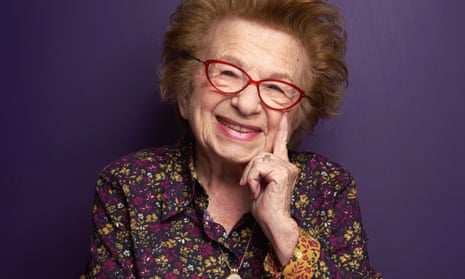
Comments (…)
Sign in or create your Guardian account to join the discussion